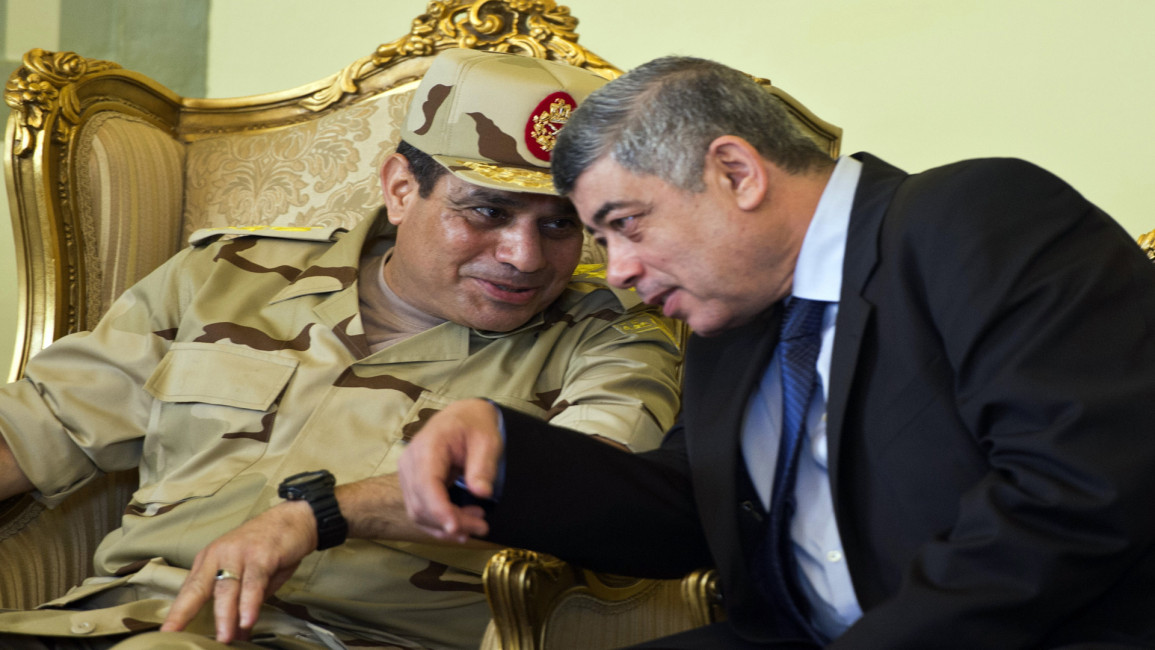
Knives out among the political elite of Egypt
The decision by Abdel Fattah al-Sisi to dismiss Mohamed Ibrahim as Egypt's interior minster raised many eyebrows. No presidential statement was issued on the decision.
It is doubtful that Sisi sacked Ibrahim to improve his public image, but there is little to suggest why he was kicked out. Perhaps he just got too big for his boots, and got in the way.
Ibrahim had much loyalty among the police. Officers were often filmed cheering and clapping their minister. Ibrahim had been resourceful at providing for his ministry, and appeared interested in the well-being of his officers and their families.
For example, he had issued compensations to officers whose cars were burned during clashes, and did not hesitate to grant their relatives jobs, with preference over other candidates. According to some, generals' wives were given civilian posts at the ministry, without interview.
A recent run of leaked conversations from the president's office illustrate the extent of the man's influence and popularity within his ministry.
They also reveal that the interior ministry was partly responsible for orchestrating the anti-Morsi demonstration of 30 June 2013, which paved the way for the army coup that pushed Mohamed Morsi from the presidency.
Without police involvement, the 30 June demonstration would have never happened, according to the leaks.
In other words, Ibrahim had refused the notion that the army should solely lead the political scene after the coup. Sisi had found himself going head-to-head with a strong and influential man, perhaps even a rival for leadership.
Thus, in the time-honoured traditions of autocrats, it became necessary to remove anyone considered even a potential threat.
A different perspective
However, there is a different interpretation that suggests that the conflict is not between Sisi and Ibrahim. Sisi was, after all, the one who nominated him to head the ministry during the Morsi regime.
His dismissal could in fact be attributed to an internal conflict within the ministry itself that goes years back. The rift is most likely to have occurred between the minister and his deputy or between their supporters, the civil and criminal divisions on the one hand, and the state security division on the other.
The examples are aplenty, including assigning Habib al-Adli, of the State Security Investigations Services, the ministry of interior in 1997, succeeding Hassan al-Alfi of the Public Funds Investigations Services.
Adli was the first of five ministers, all from state security, to have been assigned ministerial roles during the Mubarak regime.
| His dismissal could in fact be attributed to an internal conflict within the ministry itself that goes years back. |
Some analysts indicate that there is a conflict between former interior minister of the coup, Ahmed Gamal el-Din, who is currently Sisi's adviser on security and terrorism affairs, and the sacked minister Ibrahim, who was his deputy at the time and later his successor upon assignment by Morsi.
Din was sacked by Morsi in 2013 for conspiring with the National Salvation Front – an alliance of Egyptian political parties – to defeat Morsi's constitutional declaration.
This conflict between Din and Ibrahim seems to go back to December 2014. Back then, Sisi had awarded Din for his services during the 30 June anti-Morsi demonstration, with the help of a group of pro-coup officers he was leading at the Tahrir Square, by making him his security advisor and by allowing him to nominate the new minister of interior Magdy Abdel Ghafar, from Homeland Security.
So, what influences would these changes in cabinet hold? Would Egypt's 'interior' witness similar changes that purposefully weed out Sisi's rivals and the anti-coup opposition?
Assigning the ministry of interior to a general who once was the head of the notorious State or Homeland Security - which the protesters of the 2011 Egyptian revolution wanted abolished - only goes to reveal the methodology of escalation and oppression used against politicians.
The country is now in the hands of an army general, who once was the director of military intelligence, and a homeland security representative, who has access to complete files on political and civil activists.
By collaborating with the president’s security adviser Din, the grip would grow tighter on all political activists and entities, especially after issuing the new anti-terrorism law.
The clauses of such law would no doubt paint every single individual as a security threat including supporters to Sisi. Perhaps, the new minister was chosen to implement this disreputable law.
This is an edited translation of the original Arabic.
Opinions expressed in this article remain those of the author and do not necessarily reflect those of al-Araby al-Jadeed, its editorial board or staff.




